Charles E W Bean, Diaries, AWM38 3DRL 606/261/1 - 1929 - 1930 - Part 10
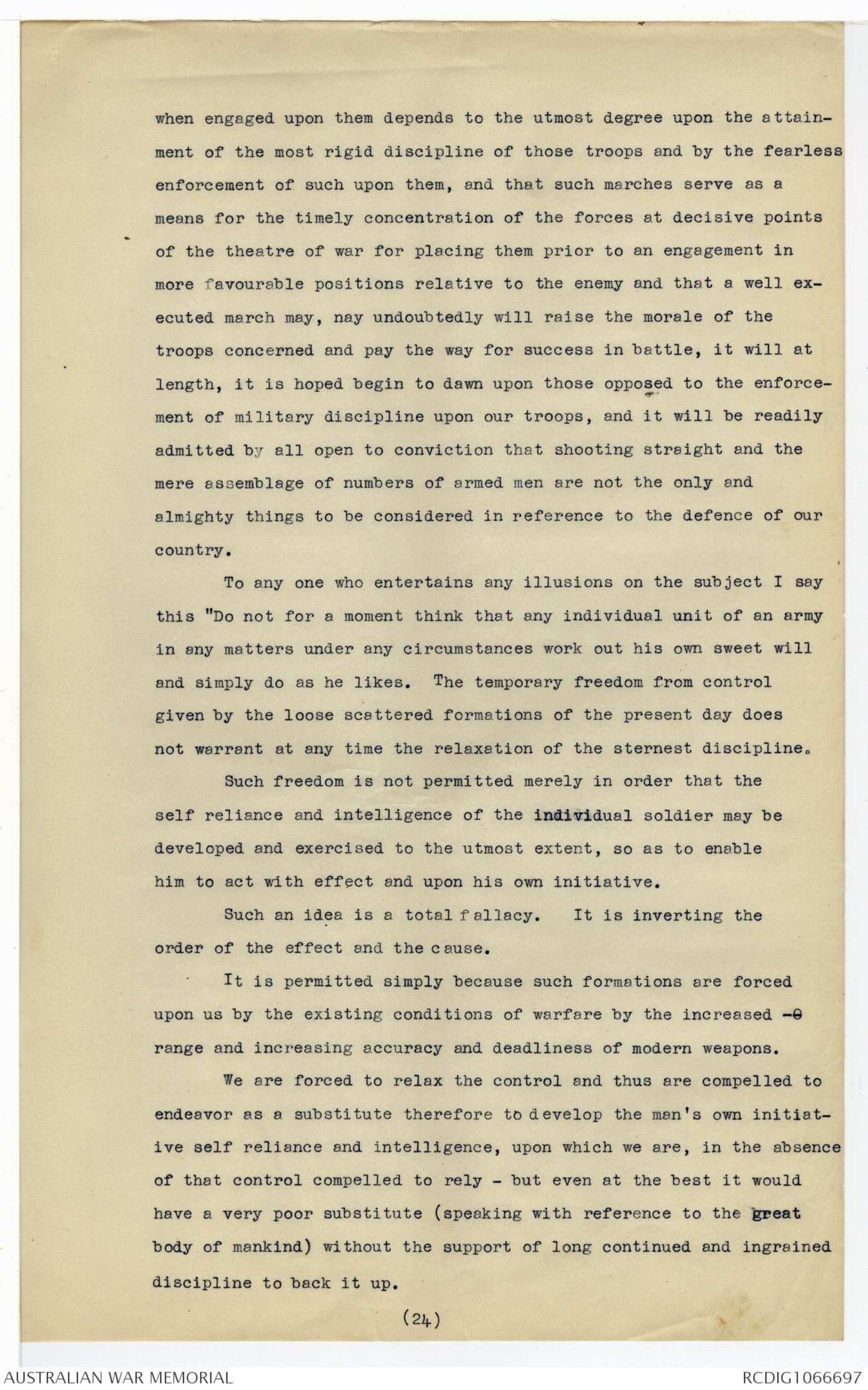
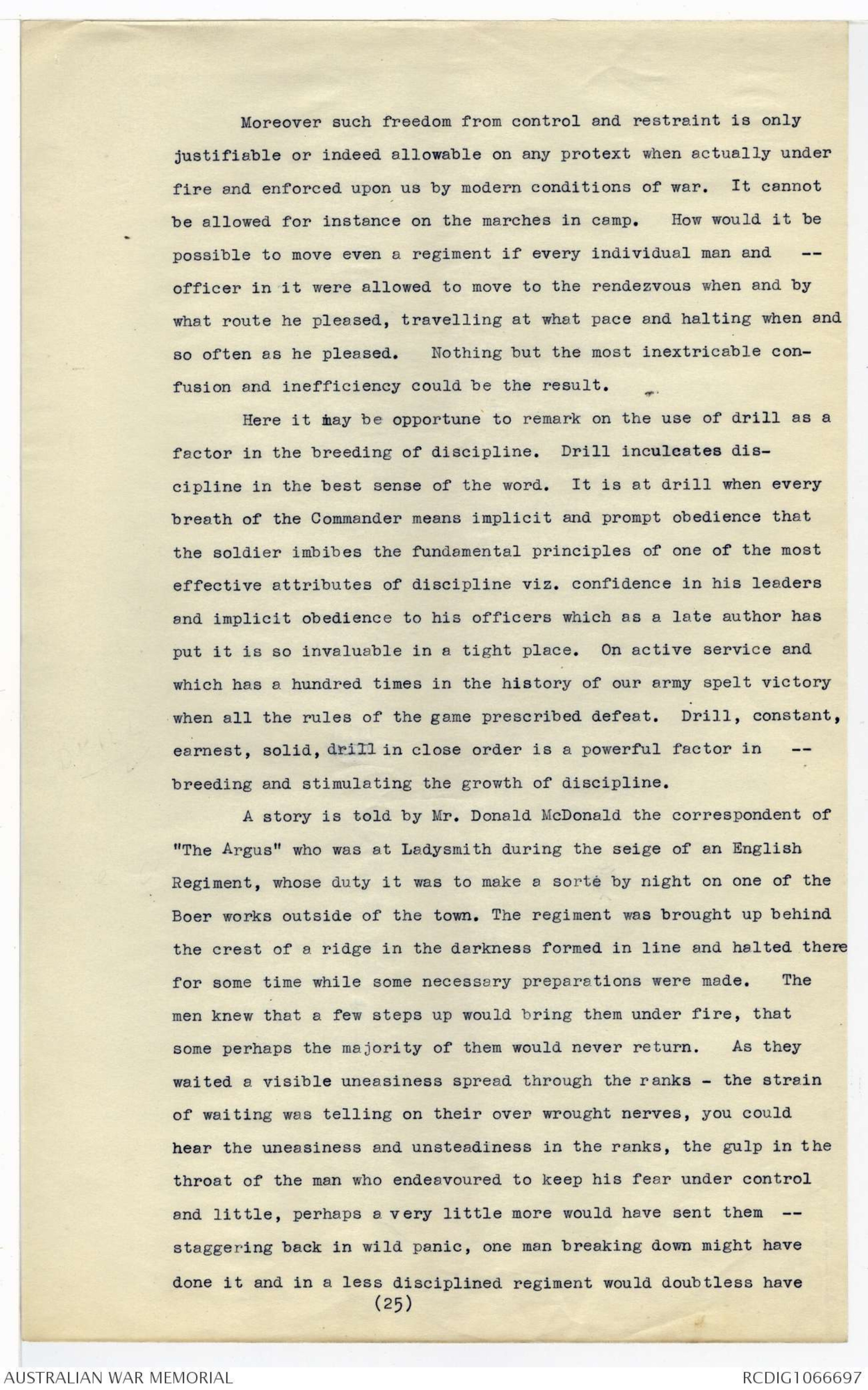
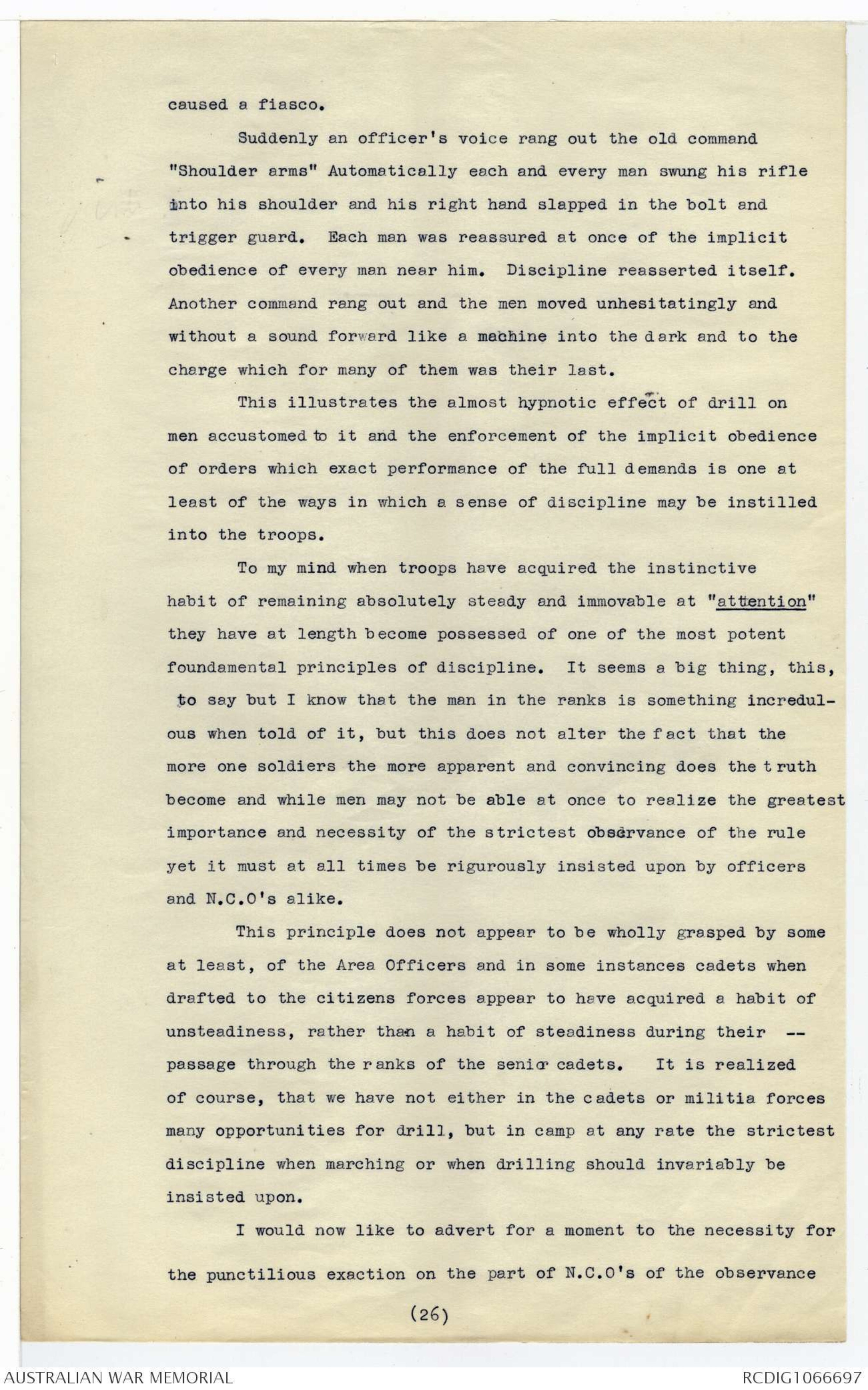
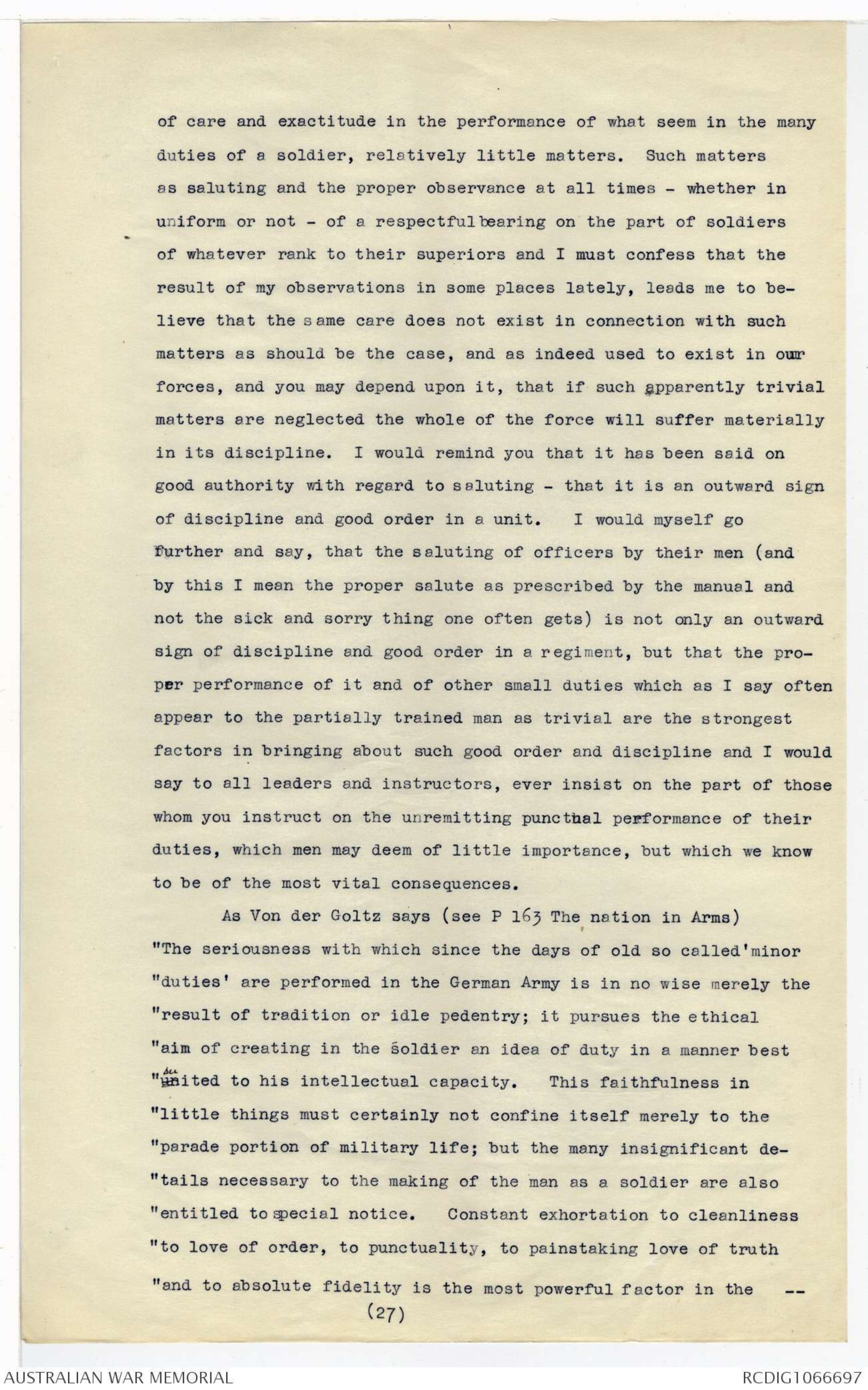
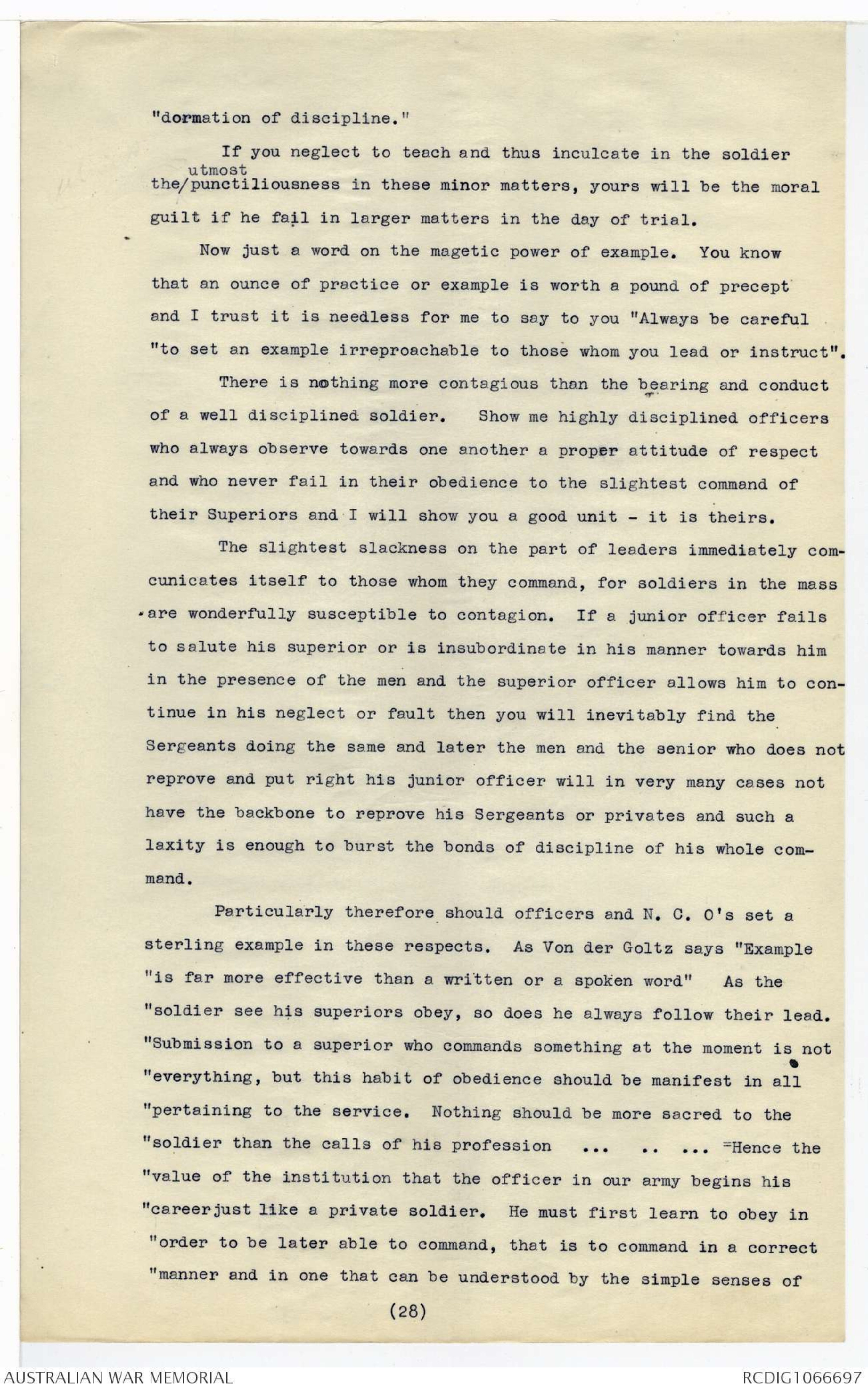
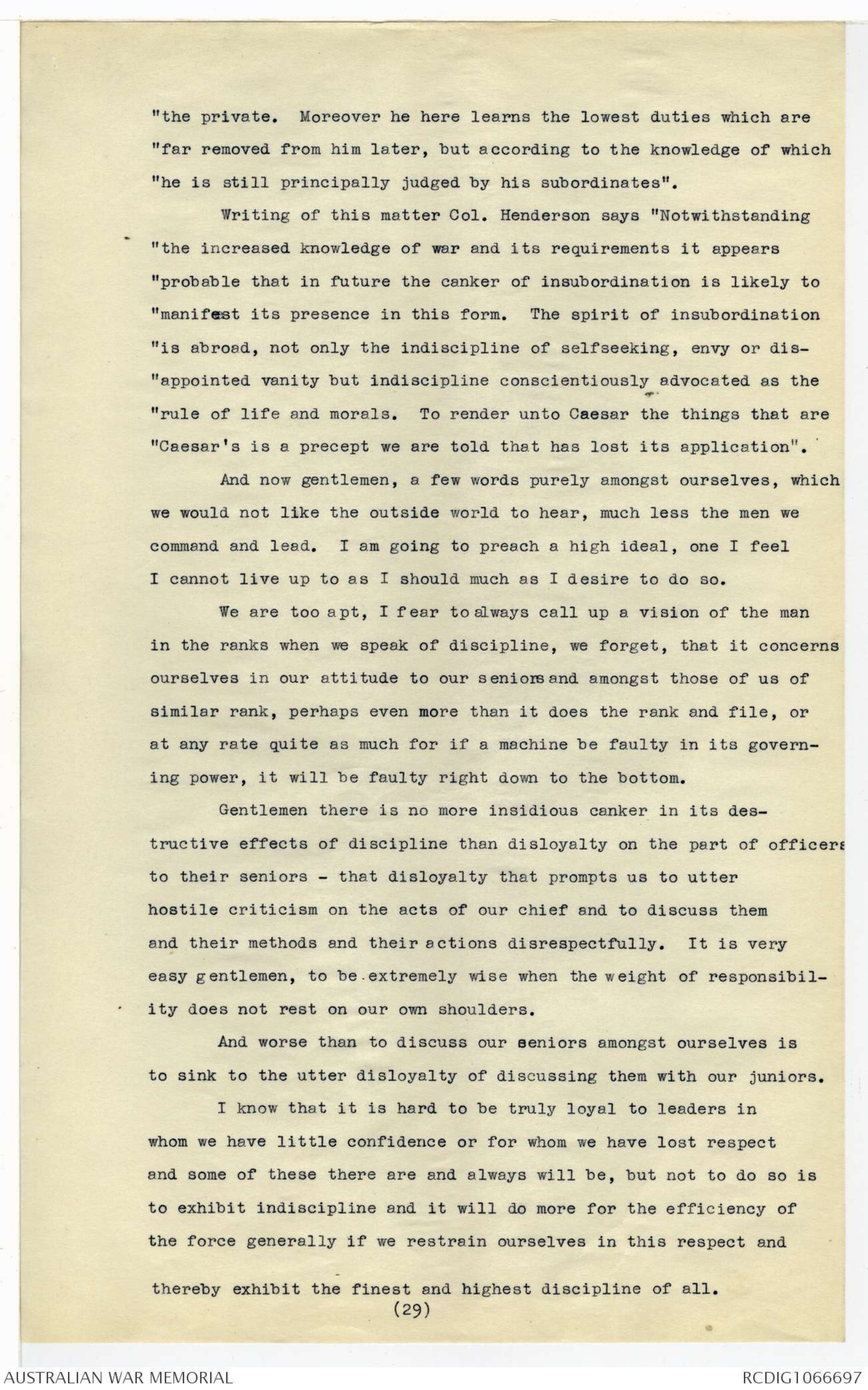
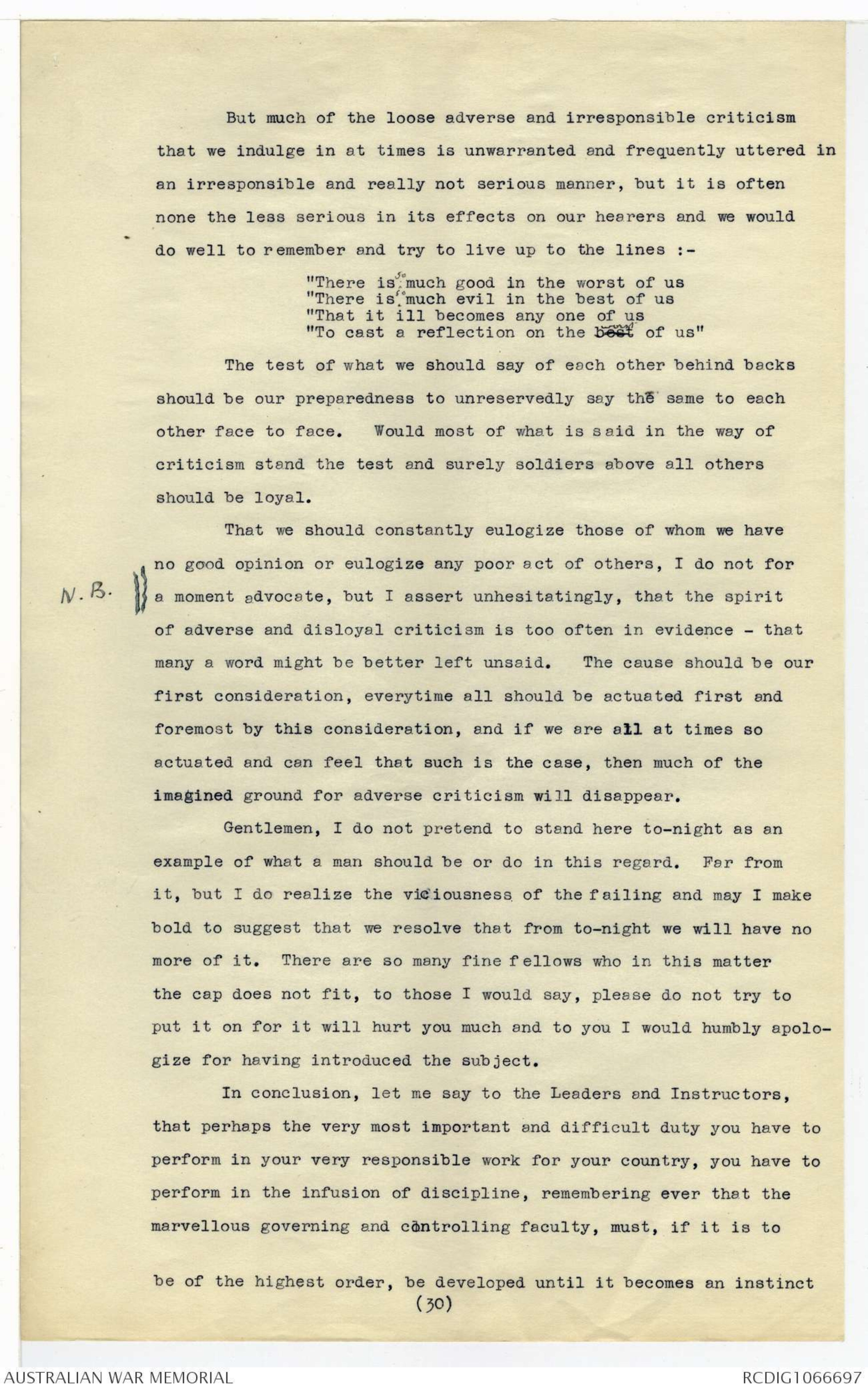
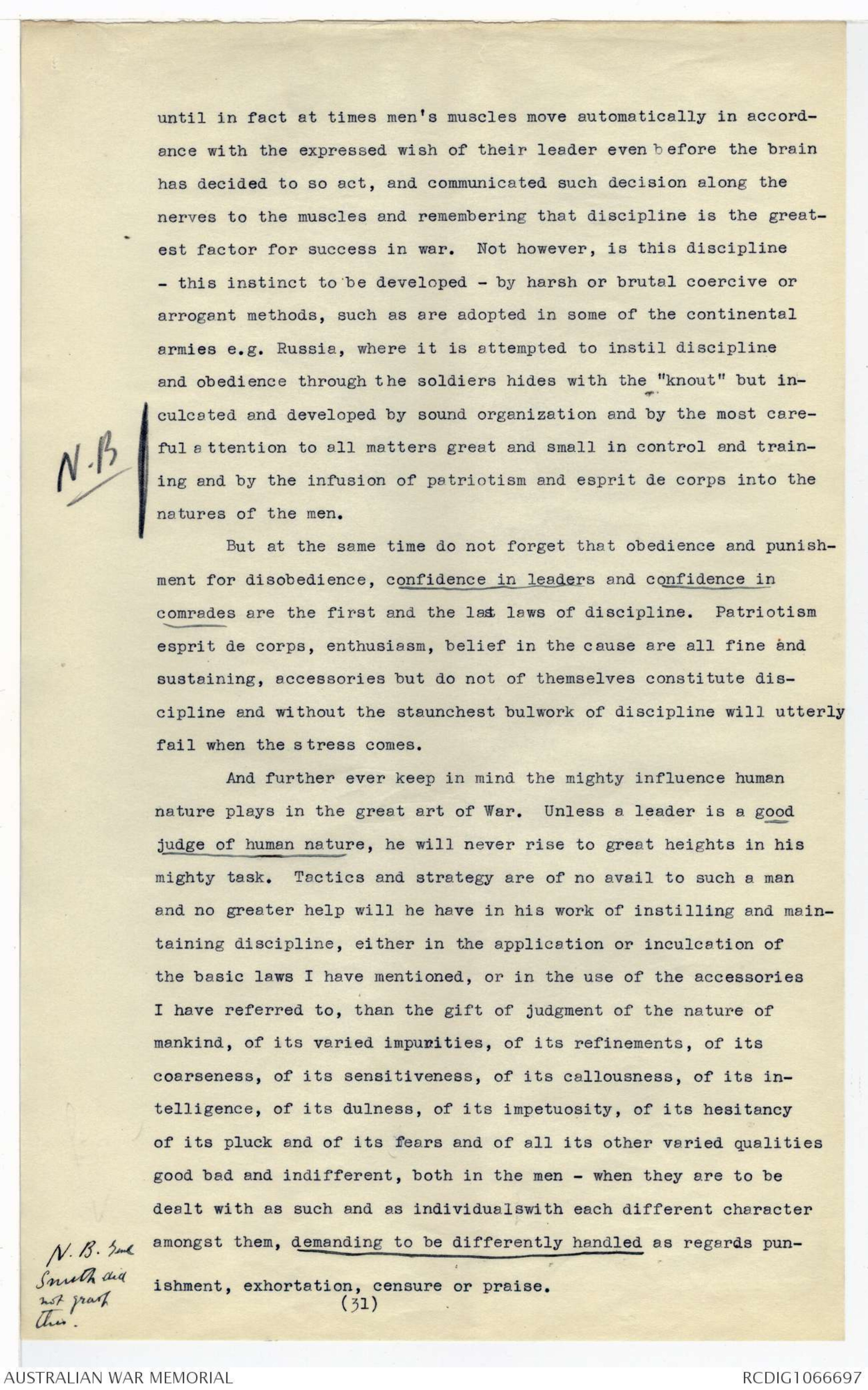
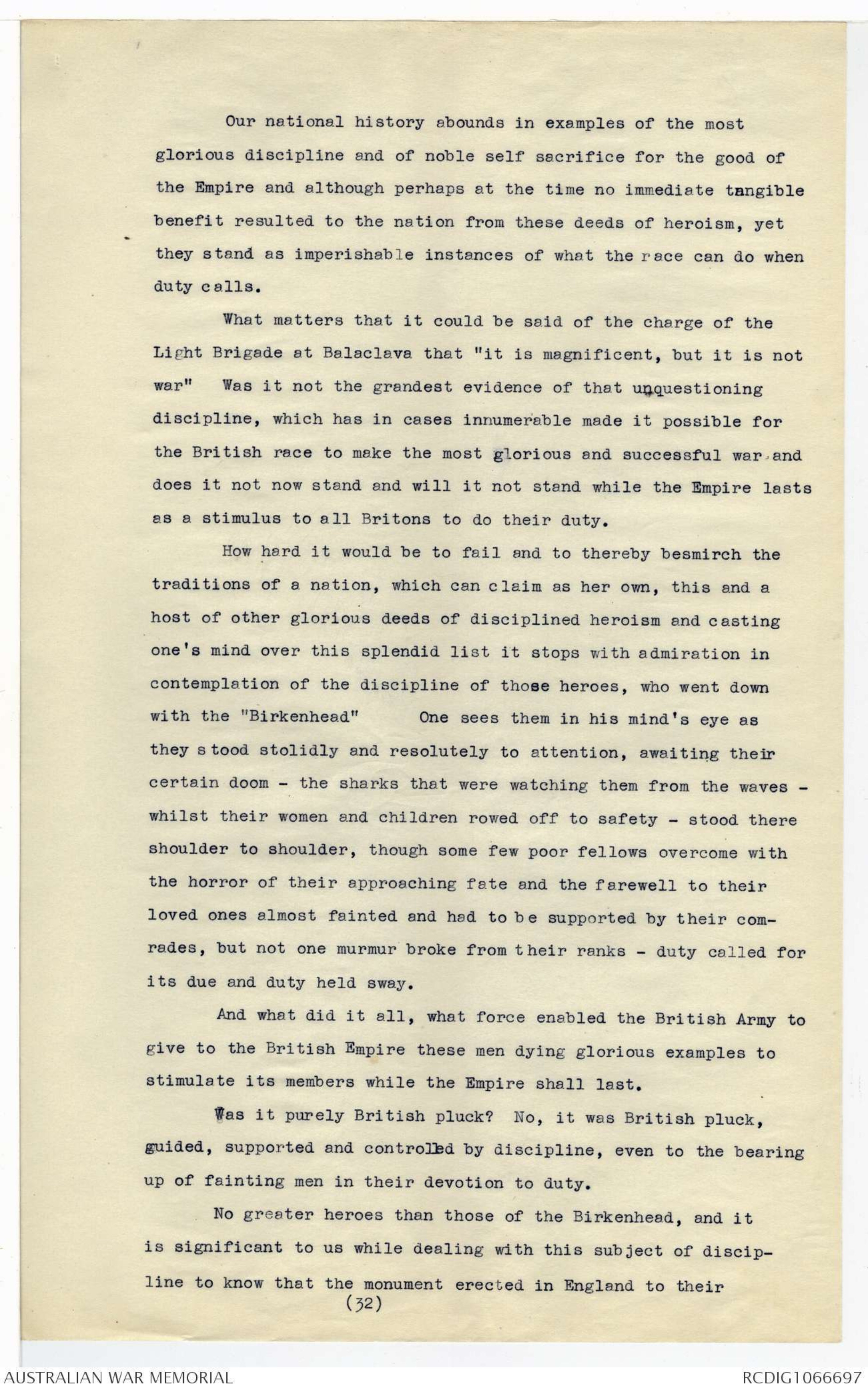
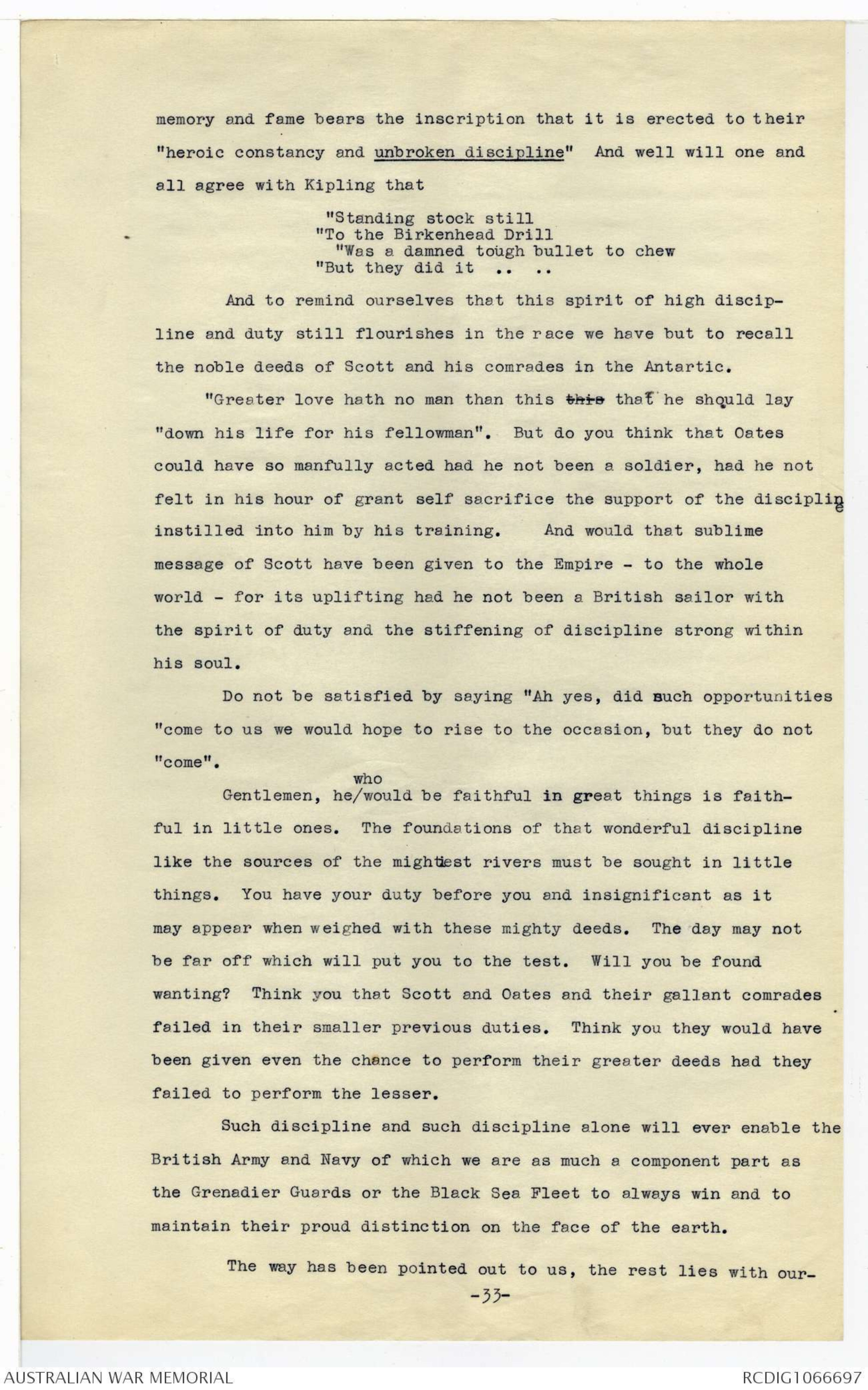
when engaged upon them depends to the utmost degree upon the attainment
of the most rigid discipline of those troops and by the fearless
enforcement of such upon them, and that such marches serve as a
means for the timely concentration of the forces at decisive points
of the theatre of war for placing them prior to an engagement in
more favorable positions relative to the enemy and that a well executed
march may, nay undoubtedly will raise the morale of the
troops concerned and pay the way for success in battle, it will at
length, it is hoped begin to dawn upon those opposed to the enforcement
of military discipline upon our troops, and it will be readily
admitted by all open to conviction that shooting straight and the
mere assemblage of numbers of armed men are not the only and
almighty things to be considered in reference to the defence of our
country.
To any one who entertains any illusions on the subject I say
this "Do not for a moment think that any individual unit of an army
in any matters under any circumstances work out his own sweet will
and simply do as he likes. The temporary freedom from control
given by the loose scattered formations of the present day does
not warrant at any time the relaxation of the sternest discipline.
Such freedom is not permitted merely in order that the
self reliance and intelligence of the individual soldier may be
developed and exercised to the utmost extent, so as to enable
him to act with effect and upon his own initiative.
Such an idea is a total fallacy. It is inverting the
order of the effect and the cause.
It is permitted simply because such formations are forced
upon us by the existing conditions of warfare by the increased -O
range and increasing accuracy and deadliness of modern weapons.
We are forced to relax the control and thus are compelled to
endeavor as a substitute therefore to develop the man's own initiative
self reliance and intelligence, upon which we are, in the absence
of that control compelled to rely - but even at the best it would
have a very poor substitute (speaking with reference to the great
body of mankind) without the support of long continued and ingrained
discipline to back it up.
(24)
Moreover such freedom from control and restraint is only
justifiable or indeed allowable on any protext when actually under
fire and enforced upon us by modern conditions of war. It cannot
be allowed for instance on the marches in camp. How would it be
possible to move even a regiment if every individual man and --
officer in it were allowed to move to the rendezvous when and by
what route he pleased, travelling at what pace and halting when and
so often as he pleased. Nothing but the most inextricable confusion
and inefficiency could be the result.
Here it may be opportune to remark on the use of drill as a
factor in the breeding of discipline. Drill inculcates discipline
in the best sense of the word. It is at drill when every
breath of the Commander means implicit and prompt obedience that
the soldier imbibes the fundamental principles of one of the most
effective attributes of discipline viz. confidence in his leaders
and implicit obedience to his officers which as a late author has
put it is so invaluable in a tight place. On active service and
which has a hundred times in the history of our army spelt victory
when all the rules of the game prescribed defeat. Drill, constant
earnest, solid, drill in close order is a powerful factor in --
breeding and stimulating the growth of discipline.
A story is told by Mr. Donald McDonald the correspondent of
"The Argus" who was at Ladysmith during the seige of an English
Regiment, whose duty it was to make a sorte by night on one of the
Boer works outside of the town. The regiment was brought up behind
the crest of a ridge in the darkness formed in line and halted there
for some time while some necessary preparations were made. The
men knew that a few steps up would bring them under fire, that
some perhaps the majority of them would never return. As they
waited a visible uneasiness spread through the ranks - the strain
of waiting was telling on their over wrought nerves, you could
hear the uneasiness and unsteadiness in the ranks, the gulp in the
throat of the man who endeavoured to keep his fear under control
and little, perhaps a very little more would have sent them --
staggering back in wild panic, one man breaking down might have
done it and in a less disciplined regiment would doubtless have
(25)
caused a fiasco.
Suddenly an officer's voice rang out the old command
"Shoulder arms" Automatically each and every man swung his rifle
into his shoulder and his right hand slapped in the bolt and
trigger guard. Each man was reassured at once of the implicit
obedience of every man near him. Discipline reasserted itself.
Another command rang out and the men moved unhesitatingly and
without a sound forward like a machine into the dark and to the
charge which for many of them was their last.
This illustrates the almost hypnotic effect of drill on
men accustomed to it and the enforcement of the implicit obedience
of orders which exact performance of the full demands is one at
least of the ways in which a sense of discipline may be instilled
into the troops.
To my mind when troops have acquired the instinctive
habit of remaining absolutely steady and immovable at "attention"
they have at length become possessed of one of the most potent
foundamental principles of discipline. It seems a big thing, this,
to say but I know that the man in the ranks is something incredulous
when told of it, but this does not alter the fact that the
more one soldiers the more apparent and convincing does the truth
become and while men may not be able at once to realize the greatest
importance and necessity of the strictest observance of the rule
yet it must at all times be rigurously insisted upon by officers
and N.C.O's alike.
This principle does not appear to be wholly grasped by some
at least, of the Area Officers and in some instances cadets when
drafted to the citizens forces appear to have acquired a habit of
unsteadiness, rather than a habit of steadiness during their --
passage through the ranks of the senior cadets. It is realized
of course, that we have not either in the cadets or militia forces
many opportunities for drill, but in camp at any rate the strictest
discipline when marching or when drilling should invariably be
insisted upon.
I would now like to advert for a moment to the necessity for
the punctilious exaction on the part of N.C.O's of the observance
(26)
of care and exactitude in the performance of what seem in the many
duties of a soldier, relatively little matters. Such matters
as saluting and the proper observance at all times - whether in
uniform or not - of a respectful bearing on the part of soldiers
of whatever rank to their superiors and I must confess that the
result of my observations in some places lately, leads me to believe
that the same care does not exist in connection with such
matters as should be the case, and as indeed used to exist in our
forces, and you may depend upon it, that if such apparently trivial
matters are neglected the whole of the force will suffer materially
in its discipline. I would remind you that it has been said on
good authority with regard to saluting - that it is an outward sign
of discipline and good order in a unit. I would myself go
further and say, that the saluting of officers by their men (and
by this I mean the proper salute as prescribed by the manual and
not the sick and sorry thing one often gets) is not only an outward
sign of discipline and good order in a regiment, but that the proper
performance of it and of other small duties which as I say often
appear to the partially trained man as trivial are the strongest
factors in bringing about such good order and discipline and I would
say to all leaders and instructors, ever insist on the part of those
whom you instruct on the unremitting punctual performance of their
duties, which men may deem of little importance, but which we know
to be of the most vital consequences.
As Von der Goltz says (see P 163 The nation in Arms)
"The seriousness with which since the days of old so called 'minor
"duties' are performed in the German Army is in no wise merely the
"result of tradition or idle pedentry; it pursues the ethical
"aim of creating in the Soldier an idea of duty in a manner best
"unsuited to his intellectual capacity. This faithfulness in
"little things must certainly not confine itself merely to the
"parade portion of military life; but the many insignificant details
"necessary to the making of the man as a soldier are also
"entitled to special notice. Constant exhortation to cleanliness
"to love of order, to punctuality, to painstaking love of truth
"and to absolute fidelity is the most powerful factor in the --
(27)
"dormation of discipline."
If you neglect to teach and thus inculcate in the soldier
the ^utmost punctiliousness in these minor matters, yours will be the moral
guilt if he fail in larger matters in the day of trial.
Now just a word on the magetic power of example. You know
that an ounce of practice or example is worth a pound of precept
and I trust it is needless for me to say to you "Always be careful
"to set an example irreproachable to those whom you lead or instruct".
There is nothing more contagious than the bearing and conduct
of a well disciplined soldier. Show me highly disciplined officers
who always observe towards one another a proper attitude of respect
and who never fail in their obedience to the slightest command of
their Superiors and I will show you a good unit - it is theirs.
The slightest slackness on the part of leaders immediately comcunicates
itself to those whom they command, for soldiers in the mass
are wonderfully susceptible to contagion. If a junior officer fails
to salute his superior or is insubordinate in his manner towards him
in the presence of the men and the superior officer allows him to continue
in his neglect or fault then you will inevitably find the
Sergeants doing the same and later the men and the senior who does not
reprove and put right his junior officer will in very many cases not
have the backbone to reprove his Sergeants or privates and such a
laxity is enough to burst the bonds of discipline of his whole command.
Particularly therefore should officers and N. C. O's set a
sterling example in these respects. As Von der Goltz says "Example
"is far more effective than a written or a spoken word" As the
"soldier see his superiors obey, so does he always follow their lead.
"Submission to a superior who commands something at the moment is not
"everything, but this habit of obedience should be manifest in all
"pertaining to the service. Nothing should be more sacred to the
"soldier than the calls of his profession ... .. ... -Hence the
"value of the institution that the officer in our army begins his
"career just like a private soldier. He must first learn to obey in
"order to be later able to command, that is to command in a correct
"manner and in one that can be understood by the simple senses of
(28)
"the private. Moreover he here learns the lowest duties which are
"far removed from him later, but according to the knowledge of which
"he is still principally judged by his subordinates".
Writing of this matter Col. Henderson says "Notwithstanding
"the increased knowledge of war and its requirements it appears
"probable that in future the canker of insubordination is likely to
"manifest its presence in this form. The spirit of insubordination
"is abroad, not only the indiscipline of selfseeking, envy or disappointed
"vanity but indiscipline conscientiously advocated as the
"rule of life and morals. To render unto Caesar the things that are
"Caesar's is a precept we are told that has lost its application".
And now gentlemen, a few words purely amongst ourselves, which
we would not like the outside world to hear, much less the men we
command and lead. I am going to preach a high ideal, one I feel
I cannot live up to as I should much as I desire to do so.
We are too apt, I fear to always call up a vision of the man
in the ranks when we speak of discipline, we forget, that it concerns
ourselves in our attitude to our seniors and amongst those of us of
similar rank, perhaps even more than it does the rank and file, or
at any rate quite as much for if a machine be faulty in its governing
power, it will be faulty right down to the bottom.
Gentlemen there is no more insidious canker in its destructive
effects of discipline than disloyalty on the part of officers
to their seniors - that disloyalty that prompts us to utter
hostile criticism on the acts of our chief and to discuss them
and their methods and their actions disrespectfully. It is very
easy gentlemen, to be extremely wise when the weight of responsibility
does not rest on our own shoulders.
And worse than to discuss our seniors amongst ourselves is
to sink to the utter disloyalty of discussing them with our juniors.
I know that it is hard to be truly loyal to leaders in
whom we have little confidence or for whom we have lost respect
and some of these there are and always will be, but not to do so is
to exhibit indiscipline and it will do more for the efficiency of
the force generally if we restrain ourselves in this respect and
thereby exhibit the finest and highest discipline of all.
(29)
But much of the loose adverse and irresponsible criticism
that we indulge in at times is unwarranted and frequently uttered in
an irresponsible and really not serious manner, but it is often
none the less serious in its effects on our hearers and we would
do well to remember and try to live up to the lines :-
"There is so much good in the worst of us
"There is so much evil in the best of us
"That it ill becomes any one of us
"To cast a reflection on the best worst of us"
The test of what we should say of each other behind backs
should be our preparedness to unreservedly say the same to each
other face to face. Would most of what is said in the way of
criticism stand the test and surely soldiers above all others
should be loyal.
That we should constantly eulogize those of whom we have
no good opinion or eulogize any poor act of others, I do not for
[*N. B.*] a moment advocate, but I assert unhesitatingly, that the spirit
of adverse and disloyal criticism is too often in evidence - that
many a word might be better left unsaid. The cause should be our
first consideration, everytime all should be actuated first and
foremost by this consideration, and if we are all at times so
actuated and can feel that such is the case, then much of the
imagined ground for adverse criticism will disappear.
Gentlemen, I do not pretend to stand here to-night as an
example of what a man should be or do in this regard. Far from
it, but I do realize the viciousness of the failing and may I make
bold to suggest that we resolve that from to-night we will have no
more of it. There are so many fine fellows who in this matter
the cap does not fit, to those I would say, please do not try to
put it on for it will hurt you much and to you I would humbly apologize
for having introduced the subject.
In conclusion, let me say to the Leaders and Instructors,
that perhaps the very most important and difficult duty you have to
perform in your very responsible work for your country, you have to
perform in the infusion of discipline, remembering ever that the
marvellous governing and controlling faculty, must, if it is to
be of the highest order, be developed until it becomes an instinct
(30)
until in fact at times men's muscles move automatically in accordance
with the expressed wish of their leader even before the brain
has decided to so act, and communicated such decision along the
nerves to the muscles and remembering that discipline is the greatest
factor for success in war. Not however, is this discipline
- this instinct to be developed - by harsh or brutal coercive or
arrogant methods, such as are adopted in some of the continental
armies e.g. Russia, where it is attempted to instil discipline
and obedience through the soldiers hides with the "knout" but inculcated
and developed by sound organization and by the most careful
[*N. B.*] attention to all matters great and small in control and training
and by the infusion of patriotism and esprit de corps into the
natures of the men.
But at the same time do not forget that obedience and punishment
for disobedience, confidence in leaders and confidence in
comrades are the first and the last laws of discipline. Patriotism
esprit de corps, enthusiasm, belief in the cause are all fine and
sustaining, accessories but do not of themselves constitute discipline
and without the staunchest bulwork of discipline will utterly
fail when the stress comes.
And further ever keep in mind the mighty influence human
nature plays in the great art of War. Unless a leader is a good
judge of human nature, he will never rise to great heights in his
mighty task. Tactics and strategy are of no avail to such a man
and no greater help will he have in his work of instilling and maintaining
discipline, either in the application or inculcation of
the basic laws I have mentioned, or in the use of the accessories
I have referred to, than the gift of judgment of the nature of
mankind, of its varied impunities, of its refinements, of its
coarseness, of its sensitiveness, of its callousness, of its intelligence,
of its dulness, of its impetuosity, of its hesitancy
of its pluck and of its fears and of all its other varied qualities
good bad and indifferent, both in the men - when they are to be
dealt with as such and as individualswith each different character
amongst them, demanding to be differently handled as regards punishment, exhortation, censure or praise.
[*N. B. Genl
Smith did
not grasp
this.*]
(31)
Our national history abounds in examples of the most
glorious discipline and of noble self sacrifice for the good of
the Empire and although perhaps at the time no immediate tangible
benefit resulted to the nation from these deeds of heroism, yet
they stand as imperishable instances of what the race can do when
duty calls.
What matters that it could be said of the charge of the
Light Brigade at Balaclava that "it is magnificent, but it is not
war" Was it not the grandest evidence of that unquestioning
discipline, which has in cases innumerable made it possible for
the British race to make the most glorious and successful war and
does it not now stand and will it not stand while the Empire lasts
as a stimulus to all Britons to do their duty.
How hard it would be to fail and to thereby besmirch the
traditions of a nation, which can claim as her own, this and a
host of other glorious deeds of disciplined heroism and casting
one's mind over this splendid list it stops with admiration in
contemplation of the discipline of those heroes, who went down
with the "Birkenhead" One sees them in his mind's eye as
they stood stolidly and resolutely to attention, awaiting their
certain doom - the sharks that were watching them from the waves -
whilst their women and children rowed off to safety - stood there
shoulder to shoulder, though some few poor fellows overcome with
the horror of their approaching fate and the farewell to their
loved ones almost fainted and had to be supported by their comrades,
but not one murmur broke from their ranks - duty called for
its due and duty held sway.
And what did it all, what force enabled the British Army to
give to the British Empire these men dying glorious examples to
stimulate its members while the Empire shall last.
Was it purely British pluck? No, it was British pluck,
guided, supported and controlled by discipline, even to the bearing
up of fainting men in their devotion to duty.
No greater heroes than those of the Birkenhead, and it
is significant to us while dealing with this subject of discipline
to know that the monument erected in England to their
(32)
memory and fame bears the inscription that it is erected to their
"heroic constancy and unbroken discipline" And well will one and
all agree with Kipling that
"Standing stock still
"To the Birkenhead Drill
"Was a damned tough bullet to chew
"But they did it ....
And to remind ourselves that this spirit of high discipline
and duty still flourishes in the race we have but to recall
the noble deeds of Scott and his comrades in the Antartic.
"Greater love hath no man than this this that he should lay
"down his life for his fellowman". But do you think that Oates
could have so manfully acted had he not been a soldier, had he not
felt in his hour of grant self sacrifice the support of the discipline
instilled into him by his training. And would that sublime
message of Scott have been given to the Empire - to the whole
world - for its uplifting had he not been a British sailor with
the spirit of duty and the stiffening of discipline strong within
his soul.
Do not be satisfied by saying "Ah yes, did such opportunities
"come to us we would hope to rise to the occasion, but they do not
come"
Gentlemen, he ^who would be faithful in great things is faithful
in little ones. The foundations of that wonderful discipline
like the sources of the mightiest rivers must be sought in little
things. You have your duty before you and insignificant as it
may appear when weighed with these mighty deeds. The day may not
be far off which will put you to the test. Will you be found
wanting? Think you that Scott and Oates and their gallant comrades
failed in their smaller previous duties. Think you they would have
been given even the chance to perform their greater deeds had they
failed to perform the lesser.
Such discipline and such discipline alone will ever enable the
British Army and Navy of which we are as much a component part as
the Grenadier Guards or the Black Sea Fleet to always win and to
maintain their proud distinction on the face of the earth.
The way has been pointed out to us, the rest lies with our-
-33-
 Deb Parkinson
Deb ParkinsonThis transcription item is now locked to you for editing. To release the lock either Save your changes or Cancel.
This lock will be automatically released after 60 minutes of inactivity.